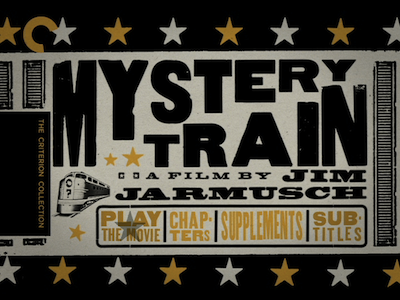
The song "Mystery Train" is only sixteen lines long, one for each car in the train being sung about. Of those sixteen lines, only half of them are unique. The remaining eight are repeats of the other eight. Its sparseness, however, is the source of its mystery. Co-written by Sam Phillips, owner of the legendary Sun Studios, and popularized by Elvis Presley [listen here], the song could easily be taken as a simplistic early-rock shuffle. Let it be, however, and it turns into something strange, sad, and haunting. Those sixteen lines only say one thing: that a train came from nowhere, picked up the singer's lover, and then left for parts unknown. Anything beyond that is up to the listener. What is this train? Where is it going? Who is inside?
Jim Jarmusch chose the song as the title for his 1989 film. Mystery Train is a love letter to Memphis, the home of Sun and Graceland, amongst other musical landmarks. It's also it's own haunting riddle--though a light-hearted one. Jarmusch's film, which he both wrote and directed, is a trilogy of distinct stories, each carrying their own passengers, but each linked like the coaches on the titular vehicle. Memphis is the destination, and a hotel at the heart of town the train's central station.
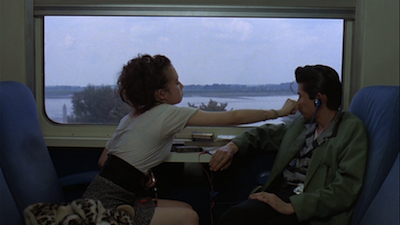
The first story in the film is "Far From Yokohama," the story of a pair of Japanese teenagers on a romantic tour of the famous spots of American rock 'n' roll. Mitzuko (Youki Kudoh) is a cute teenybopper who adores Elvis Presley, while her stone-faced boyfriend, Jun (Masatoshi Nagase), prefers Carl Perkins. He has adopted the rockabilly style, including a slick-backed pompadour and a silver Zippo that he wields like a killer with a butterfly knife. The couple are both fish out of water and wide-eyed innocents, their foreignness making them stand out while also representing the inclusiveness of the music. Jun doesn't say much, but when he does, it's important. Staring out his hotel window, he can only marvel at the excitement of being 18 and free to visit Tennessee.
Arguably, Jun and Mitzuko could also be said to merely be tourists in someone else's genuine experience--decades later, from a land somewhere distant. If Elvis and other white men stole rock 'n' roll from African Americans, then how far removed are these travellin' teens? Jun isn't the only one to dislike Elvis, who permeates just about every scene in Mystery Train. His portrait hangs over the bed in every hotel room, and the point is made that even though the hotel is in a black neighborhood and serviced by black employees, it's owned by whites. On one hand, it's cultural tourism; on the other, a great unifier.
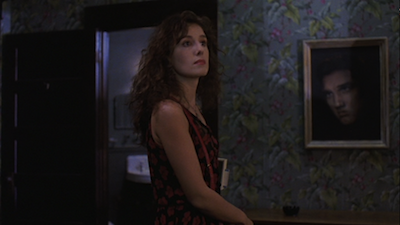
Not that Mystery Train is a political film; truly, I digress. Chapter 2, in fact, immediately gets a little more serious, but also much more silly. "A Ghost" is the tale of Luisa (Nicoletta Braschi), an Italian stuck in Memphis waiting for a connecting flight to take her husband's body back to Rome. She goes into the city to kill time, and the trusting Luisa is conned by just about everyone she sees. A magazine seller (Sy Richardson) guilts her into buying more than she needs, and a creepy bunko artist (Tom Noonan) tries to sell her a story about Elvis's ghost sending her a message. She happily goes along, but give an inch, and this guy takes a sinister mile. Luisa ends up at the same hotel as the Japanese kids, in the room next door even. Luisa also ends up sharing these digs with a motor-mouthed woman down on her luck (Elizabeth Bracco), an act of charity and happenstance. By the end of the night, Luisa witnesses the true magic of Elvis and his city, as baffling and seemingly inconsequential as that may be.
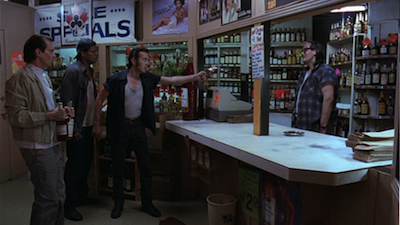
The third story, "Lost in Space," gives us three local boys--though the two white guys are transplants, one from England and the other from Jersey. On a drunken night out, the guys are turned into fumbling criminals by the rash actions of one of their crew. Johnny (played by Clash-frontman Joe Strummer) is having some problems, not the least of which is that everyone keeps calling him Elvis, much to his chagrin. (What else you going to call a white guy with a pompadour? Morrissey, maybe?) Johnny and his pal Will Robinson (Rick Aviles) just got laid off from their jobs. (Will Robinson doesn't need an annoying nickname, he has enough reasons to hate his real name. Danger! Danger!) Johnny is also the guy that the woman rooming with Luisa is running out on. Her brother is a barber named Charlie (Steve Buscemi), who is the runt of this particular litter. Drunk off his ass, Johnny shoots a liquor store clerk (Rockets Redglare) when he says something racist about Will, and the guys go on the run, though that largely means circling around town. They eventually hole up in a cursed room in the hotel. Jarmusch throws in a great gag: the Elvis painting in that room is not of the cool King of 1956, but the bloated elder monarch.
All three stories in Mystery Train intersect in small ways. The Japanese kids pass Charlie outside his barber shop, and Luisa hears them having sex through the walls. All the stories have the same late-night fulcrum: Elvis singing "Blue Moon" on the radio (Tom Waits voices the DJ). And then, of course, they end up at the same hotel, all on the same floor, and each shocked into the oncoming day by a gunshot. The night clerk at the hotel is played by the incomparable Screamin' Jay Hawkins, and I am not sure if it's the "I Put a Spell On You" singer's reputation or his bright red suit that makes him seem like the gatekeeper of the underworld. He doesn't act all that demonic here, he's actually pretty calm and even kind. He and his bellhop (Cinqué Lee, brother of Spike) act as comic relief, the mystified observers who see all these travelers coming through their town.
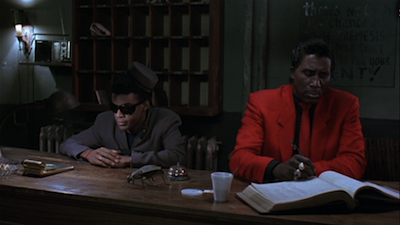
The Memphis of Jarmusch's world works as a kind of Mecca, drawing people its way, a stop on the journey looking for something else. It clearly holds its own attraction for the filmmaker. Mystery Train is as much a document of the infamous locale as it is a fictional narrative. Jarmusch and his regular cinematographer Robbie Müller lovingly capture the rundown sights, following the characters as they walk the streets, keeping the shots wide so that we can see everything they may not. Sun Studios is strangely disappointing, small and clinical looking. Other important spots are left to decay. Is that really the Stax studios all boarded up, only marked by the name spray painted on the outside?
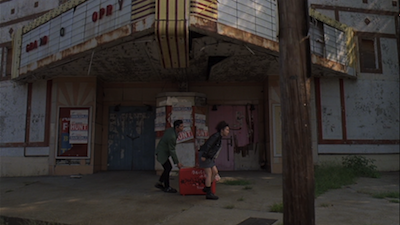
Though the city has clearly fallen on hard times--excepting, most likely, the unseen Graceland--Jarmusch and Müller find a unique beauty in it. The homes they pass have distinct shapes and colors, and the businesses have an aura of lost Americana. Perhaps this is what the travelers are searching for. Memphis is like the Purgatory between the paradise of dreams long past and the reality of the future. Rock is the flashpoint of our desires, the train is carrying away the youth and hope it represents.
In the end, like the locomotive in the song, Mystery Train the movie comes and goes, giving little explanation. Everyone but the night clerk and the bellhop move on; Screamin' Jay and his mosquito-legged chimpanzee (as he calls him) continue to be the stewards for the rest of us. Jarmusch avoids sewing it all up. The meaning is what you choose to take from it. Like the best rock songs, it seemingly a lark, something designed to move the audience, even if just temporarily; at the same time, like those tunes, it worms its way into your head, inviting further rumination and new visits. I just saw it, and I kind of want to watch it again.
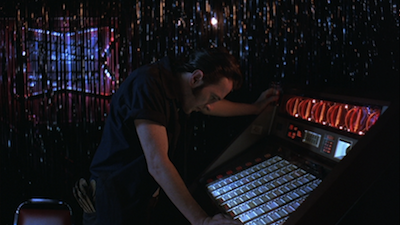
The new Criterion release of Mystery Train is a fantastic package. It's my first time seeing it (and I think completes my Jarmusch education), so I can't comment directly on how much this is an improvement over the previous DVD release, but considering how good the Criterion updates of the MGM back catalogue have been in the past (including Jarmusch's Stranger Than Paradise), I'm fairly confident that this new transfer is light years ahead of what we've seen on disc before. The colors are gorgeous, and the landscapes really come to life. I also love that Jarmusch left a hair in the bottom of the frame in one scene. It's such a natural accident, it feels oddly quaint to see something like it these days.
The history of the location and the music is further explored in a new documentary on the disc, and we also get excerpts from a Screamin' Jay Hawkins documentary. Mystery Train is the kind of film that should inspire its fans to want to know more about what it is paying tribute to. If nothing else, go get some Rufus Thomas records. (He appears on the soundtrack [listen to "Memphis Train"], and he's also the guy who asks Mitzuko for a light in the train station.) Special mention needs to be made of another excellent package design. The front cover emulates old road show posters for touring musical packages, the DVD itself is made to look like an old 45 record, and a double-page spread in the booklet shows the labels from the original 45s for songs featured in the movie. As a music geek, I couldn't be more thrilled.
This disc was provided by the Criterion Collection for purposes of review.

2 comments:
Hi! Can you please indicate exactly the scene with a hair in the bottom of the frame? Thank you!
It's one of the scenes where Luisa is walking through Memphis just after leaving the airport. She passes a vacant lot, and there is a hair in the low edge of the frame, looks like it was on the lens.
Post a Comment